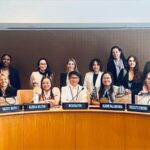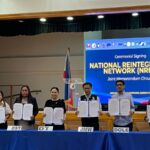A senior official of the Department of Social Welfare and Development (DSWD) on Wednesday (June 11) discussed the Philippine government’s measures to protect children involved in armed conflicts during a side event of the 18th Session of the Conference of States Parties to the Convention on the Rights of Persons with Disabilities (COSP18-CRPD) at the United Nations (UN) Headquarters in New York City.
Serving as a panelist to the side event titled, “Protecting Children in Armed Conflict, Safeguarding Futures,” Asst. Secretary Elaine Fallarcuna of the DSWD’s Legislative Affairs Group (LAG) cited various child protection legislations and actions to ensure the best interest of children in armed conflict.
“For decades, the Philippines has faced multiple internal armed conflicts, affecting thousands of communities where children bore a disproportionate share of this burden. Recognizing this, the Philippine government has persistently pursued peace negotiations, community engagement, and the reintegration of former combatants. With this, we are able to steadily dismantle the structures of violence and build pathways to sustainable peace,” Asst. Secretary Fallarcuna said in her introductory remarks.
The DSWD executive shared in her discussion the significant policies that were created to protect children from being placed in situations of armed conflict such as the enactment of Republic Act No. 11188 or the “Special Protection of Children in Situations of Armed Conflict Act”; the creation of the Inter-Agency Committee on Children in Situations of Armed Conflict (IAC CSAC); and, the institutionalization of a Monitoring, Reporting, and Response System (MRRS) which is a reporting mechanism to address grave child rights violations.
Asst. Secretary Fallarcuna stressed that the establishment of the MAKABATA Program which institutionalizes the MAKABATA Helpline 1383 — a nationwide and multiplatform child protection reporting and response program.
Aside from policies and programs, Asst. Secretary Fallarcuna pointed out the continuous collaboration of the Philippine government with concerned development institutions, organizations, and stakeholders as one of the factors that helped reduce child rights violations
“Together with the UN, civil society, and other stakeholders, we have improved our national reporting mechanism, expanded our capacities, and aligned our programs with global norms. As a result of these efforts, we have seen a measurable decrease in grave child rights violations. From 69 cases in 2018, 79 cases in 2019, and 25 cases in 2023, for 2024, the Philippines has brought down the cases of grave child rights violations to only 9,” the DSWD senior official emphasized.
Joining Asst. Secretary Fallarcuna as panelists in the side event were H.E. Evangelos C. Sekeris, Permanent Representative of Greece to the UN; H.E. Sophie De Smedt, Permanent Representative of Belgium to the UN; H. E. Eloy Alfaro de Alba, Permanent Representative of Panama to the UN; and, H.E Michaela B. E. Swallow, Chargé d’ Affaires a.i., Permanent Mission of Sierra Leone to the UN.
The COSP18-CPDR, which is from June 10 to 12, is organized by the UN Special Rapporteur on trafficking in persons, especially women and girls and the UN Special Rapporteur on the rights of persons with disabilities. (AKDL)


